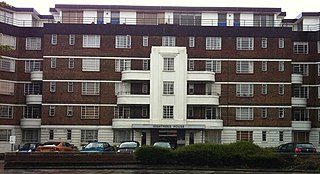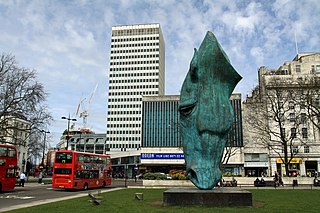
Estoppel is a judicial device in common law legal systems whereby a court may prevent or "estop" a person from making assertions or from going back on his or her word; the person so prevented is said to be "estopped". Estoppel may prevent someone from bringing a particular claim. Legal doctrines of estoppel are based in both common law and equity. Estoppel is also a concept in international law.

Central London Property Trust Ltd v High Trees House Ltd [1947] KB 130 is a famous English contract law decision in the High Court. It reaffirmed and extended the doctrine of promissory estoppel in contract law in England and Wales. However, the most significant part of the judgment is obiter dicta as it relates to hypothetical facts; that is, the landlord did not seek repayment of the full wartime rent.

Foakes v Beer[1884] UKHL 1 is an English contract law case, which applied the controversial pre-existing duty rule in the context of part payments of debts. It is a leading case from the House of Lords on the legal concept of consideration. It established the rule that prevents parties from discharging an obligation by part performance, affirming Pinnel's Case (1602) 5 Co Rep 117a. In that case it was said that "payment of a lesser sum on the day [i.e., on or after the due date of a money debt] cannot be any satisfaction of the whole."

Estoppel in English law is a doctrine that may be used in certain situations to prevent a person from relying upon certain rights, or upon a set of facts which is different from an earlier set of facts.

D & C Builders Ltd v Rees [1965] EWCA Civ 3 is a leading English contract law case on the issue of part payment of debt, estoppel, duress and just accord and satisfaction.

Baird Textile Holdings Ltd v Marks & Spencer plc [2001] EWCA Civ 274 is an English contract law case on the possibility of an implied contract after a course of dealings between two businesses.

Bruton v London and Quadrant Housing Trust[1999] UKHL 26 is an English land law case that examined the rights of a 'tenant' in a situation where the 'landlord', a charitable housing association had no authority to grant a tenancy, but in which the 'tenant' sought to enforce the duty to repair on the association implied under landlord and tenant statutes. The effect of the case is to create the relationship of de facto landlord and tenant between the parties.

Waltons Stores (Interstate) Ltd v Maher, is a leading case in Australian contract law. The Australian High Court decided that estoppel, in certain circumstances, could be a cause of action.

City and Westminster Properties (1934) Ltd v Mudd [1959] Ch 129 is an English contract law case, regarding the parol evidence rule. It illustrates one of the large exceptions, that a written document is not deemed to be exhaustive of the parties intentions when there is clear evidence of a collateral contract. It shows that even evidence from outside a written agreement may contradict evidence inside it.

Crabb v Arun District Council [1975] EWCA Civ 7 is a leading English land law and contract case concerning "proprietary estoppel". Lord Denning MR affirmed that where agreements concern the acquisition of rights over land, there is no need for both parties to provide a consideration for upholding the bargain. While promissory estoppel cannot found a cause of action it was held that in the peculiar situation of land, consideration is not necessary at all.

Street v Mountford[1985] UKHL 4 is an English land law case from the House of Lords. It set out principles to determine whether someone who occupied a property had a tenancy, or only a licence. This mattered for the purpose of statutory tenant rights to a reasonable rent, and had a wider significance as a lease had "proprietary" status and would bind third parties.
Cobbe v Yeoman's Row Management Ltd[2008] UKHL 55 is a House of Lords case in English land law and relates to proprietary estoppel in the multi-property developer context. The court of final appeal awarded the project manager £150,000 on a quantum meruit basis for unjust enrichment because Yeoman's Row had received the benefit of his services without paying for that. The court refused to find or acknowledge a binding contract, prior arrangement with a third party or promise, overturning a £2m award on the basis of a possible lien arising from a promise over the property. The court found a non-binding agreement in principle, entirely subject to the owner's final say to take into account for example their view of the market; this was the basis on the facts on which the parties were proceeding.
Collier v P & MJ Wright (Holdings) Ltd[2007] EWCA Civ 1329 is an English contract law case, concerning the doctrine of consideration and promissory estoppel in relation to "alteration promises".
Union Eagle Ltd v Golden Achievement Ltd [1997] UKPC 5 is an English contract law case, concerning the right to terminate performance of a contract.

Ogilvy v Hope Davies [1976] 1 All ER 683 is an English contract law case concerning promissory estoppel.

English land law is the law of real property in England and Wales. Because of its heavy historical and social significance, land is usually seen as the most important part of English property law. Ownership of land has its roots in the feudal system established by William the Conqueror after 1066, but is now mostly registered and sold on the real estate market. The modern law's sources derive from the old courts of common law and equity, and legislation such as the Law of Property Act 1925, the Settled Land Act 1925, the Land Charges Act 1972, the Trusts of Land and Appointment of Trustees Act 1996 and the Land Registration Act 2002. At its core, English land law involves the acquisition, content and priority of rights and obligations among people with interests in land. Having a property right in land, as opposed to a contractual or some other personal right, matters because it creates priority over other people's claims, particularly if the land is sold on, the possessor goes insolvent, or when claiming various remedies, like specific performance, in court.

National Provincial Bank Ltd v Ainsworth [1965] is an English land law and family law case, concerning the quality of a person's interest in a home when people live together, as well as licenses in land.

Solle v Butcher [1950] 1 KB 671 is an English contract law case, concerning the right to have a contract declared voidable in equity. Denning LJ reaffirmed a class of "equitable mistakes" in his judgment, which enabled a claimant to avoid a contract. Denning LJ said,
... a contract will be set aside if the mistake of the one party has been induced by a material misrepresentation of the other, even though it was not fraudulent or fundamental; or if one party, knowing that the other is mistaken about the terms of an offer, or the identity of the person by whom it is made, lets him remain under his delusion and concludes a contract on the mistaken terms instead of pointing out the mistake.... A contract is also liable in equity to be set aside if the parties were under a common misapprehension either as to facts or as to their relative and respective rights, provided that the misapprehension was fundamental and that the party seeking to set it aside was not himself at fault.

Cavendish Square Holding BV v Talal El Makdessi[2015] UKSC 67, together with its companion case ParkingEye Ltd v Beavis, are English contract law cases concerning the validity of penalty clauses and the application of the Unfair Terms in Consumer Contracts Directive. The UK Supreme Court ruled on both cases together on 4 November 2015, updating the established legal rule on penalty clauses and replacing the test of whether or not a disputed clause is "a genuine pre-estimate of loss" with a test asking whether it imposed a proportionate detriment in relation to any "legitimate interest" of the innocent party.

Rock Advertising Ltd v MWB Business Exchange Centres Ltd[2018] UKSC 24 is a judicial decision of the Supreme Court of the United Kingdom relating to contract law, concerning consideration and estoppel. Specifically it concerned the effectiveness of "no oral variation" clauses, which provide that any amendments or waiver in relation to the contract must be in writing.

















